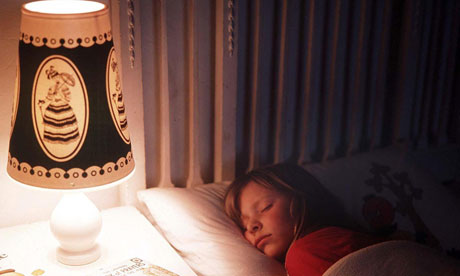
One of the privileges of writing columns like this is that I can say "you" when I mean "I" and pretend that the things I routinely mess up are universal foibles rather than the singular errors of my own stupidity. So: when YOU are a parent, YOU may find that the hours approaching bedtime involve a steady increase in household tension as YOUR hellion children line up their tactics to avoid the duvet deadline. (Gosh, mine too. I'm so glad we understand each other's nightly sufferings.)
Today's news throws an extra gob of fretfulness into these battles: researchers from University College London have published a paper showing a connection between irregular or consistently late bedtimes for children and reduced ability in reading, maths and spatial skills. Or maybe this is an advantage in disguise and can be turned into another weapon in my (sorry, OUR) armoury of go-to-bed threats: "Go to sleep so mummy can watch Parks and Recreation, or no football, no story tomorrow, and you'll have diminished cognitive skills as demonstrated by arbitrary tests."
The study's authors suggest that there could be a direct causal link between the bedtimes and the test scores, and any parent who remembers the agonised sleep deprivation of the baby stage can probably accept that theory. I say "any parent who remembers" because, what with the misery of being woken every few hours for several months by a tiny screaming bag of milk-hunger, it's possible that a few parents forget the early months altogether.
My sense of the first weeks with each of my children are a kind of grey, arrhythmic montage: light and dark, wailing (theirs) and crying (mine) in no predictable order, and definitely no learning on my part, unless you count getting the World Service schedule by heart so I could tell exactly what god-awful part of the night I'd been thrown into without looking at the clock.
Sleep is obviously critical, then, but that doesn't mean the role it plays is definitely the one reported. It's possible that instead of causing the reduced test scores, the erratic bedtimes are a proxy for other issues that might make it harder for children to learn – although when you have a look at the researchers' table showing all the interlinked variables in a child's upbringing, you get a feeling for the problems inherent in measuring the making of a person.
A couple of figures catch the eye though: unsurprisingly, the children with later bedtimes are reported to watch more TV and be more likely to miss breakfast (presumably because they're oversleeping); fathers of children who go to bed early are more likely to say they don't see enough of their kids, and mothers of the irregular bedtimers are more likely to be "often irritated". (Look, it's very stressful being snarled up in a debate with an 11-year-old about whether a goodnight kiss given before YOU turn the light out still counts as an official goodnight kiss.)
But it's hardly obvious that telling parents their children need regular bedtimes is all the nudge they need to create a nation of prompt little pyjama-wearers. Most parents, I suspect, look forward to that short interregnum between child-rearing hours and their own bedtime for its own sake more than any prospect of boosting the kids' IQ.
Long work hours, difficult shift patterns, unsettled home lives – all these things might be reasons for wonky bedtimes, and none of them are easily fixed. We don't even know how many children are affected, so even if sleep patterns are the problem, we can't say yet how big that problem is. What we can say, though, is that everyone should learn to appreciate the pleasure of a good kip – adults and children, and especially (oh please, please, please) my children.

